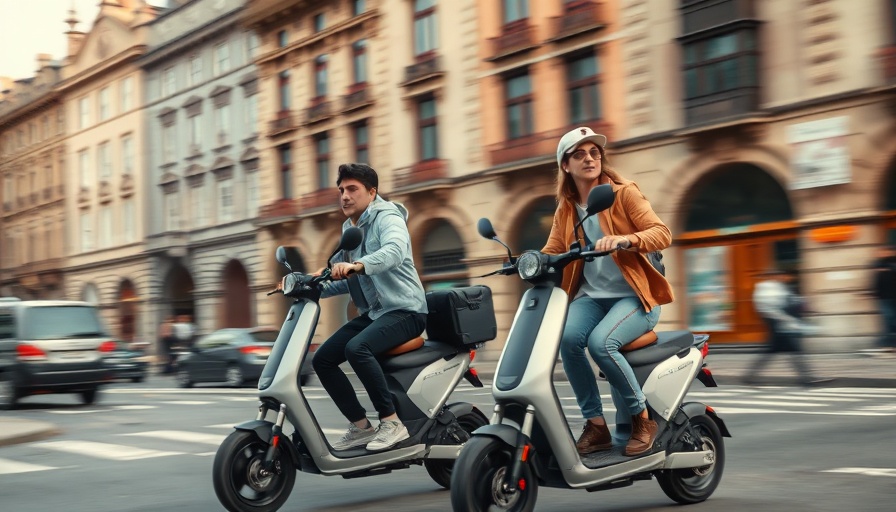
Save Money and the Planet: Ditch Your Car!
In a fast-paced world where convenience is king, many of us are so accustomed to driving that we forget there are greener, more economical options available. By rethinking our daily transport habits, we can significantly benefit not just our wallets but the environment as well. Embracing alternative transportation isn't merely a trend; it's a crucial step towards sustainable living and combating climate change.
The Green Revolution in Urban Mobility
Cities across the globe are responding to the climate crisis by investing in eco-friendly infrastructure and public transport systems. This shift towards sustainable mobility enhances city life, making it not only more pleasant but also healthier. As we embrace alternatives to the car, we contribute to cleaner air, reduce CO₂ emissions, and promote vibrant communities.
5 Eco-Friendly Alternatives: Your Path to Sustainable Travel
Embracing alternative means of transport doesn't just minimize environmental impact; it can also save you money and enhance your experience while traveling. Here are five eco-friendly options:
1. High-Speed Trains: The Future of Long-Distance Travel
For those who need to travel between cities, high-speed trains offer convenience and efficiency. While punctuality can sometimes be inconsistent, trains reduce your commuting time significantly by avoiding road traffic. Plus, they often provide amenities that allow you to work or relax during your journey.
2. Bicycles and Electric Scooters: Perfect for City Travel
For shorter journeys, nothing beats the agility and accessibility of bicycles and electric scooters. Many cities are investing in dedicated cycling lanes, making these modes safer and more enjoyable. Moreover, cycling is not only environmentally friendly, but it's also a fantastic way to incorporate exercise into your day.
3. Public Transportation: Affordable and Green
Subways, buses, and trams are often the most affordable options for urban transport. Many municipalities are transitioning to electric or low-emission vehicles, enhancing sustainability efforts. The benefits extend beyond cost savings; you can use commute time to read, work, or unwind without the stress of parking.
4. Bike and Scooter Sharing Services: Flexibility at Your Fingertips
Whether you don't own a bike or prefer not to maintain one, bike and scooter sharing services have surged in popularity. They offer flexibility, allowing you to grab a bike or scooter whenever you need one. Apps make it easy to unlock and return these vehicles, promoting efficiency in city travel.
5. Car Sharing: An Economical Solution When Needed
Car sharing services provide an excellent alternative when you absolutely need a car. Offering flexible pricing based on usage, you can rent electric vehicles that are often exempt from low-emission regulations. By opting for car sharing, you avoid the ongoing costs associated with car ownership.
Making a Smooth Transition to Alternative Transport
Shifting away from car dependence may seem daunting, but with careful planning, it can be a rewarding experience. Start by assessing your daily commuting needs and identifying local alternatives. Take advantage of apps that can assist in mapping out your travels using public transport or bike-sharing services. As you make the switch, you'll likely discover not just financial benefits but enhanced personal well-being and community engagement.
Future Trends: The Evolution of Sustainable Transportation
As climate concerns escalate, the trend of moving away from cars is set to evolve. Expect to see innovations in fleet sizes for shared services, enhanced bike infrastructure, and even cleaner energy solutions. With active public and private investments in sustainable transport, we can anticipate cities that prioritize greener options.
The Emotional Impact: Connecting with Your Community
One of the most gratifying aspects of foregoing a car is the opportunity to engage more with your surroundings. Walking, cycling, or taking public transit allows for shared experiences that deepen the connection to your neighborhood. Walking or pedaling through your local area familiarizes you with local businesses and community hotspots, ultimately leading to a more vibrant and interconnected living environment.
Take Action for a Sustainable Future
Transitioning to alternative transport options is a significant step towards fostering a sustainable future. As we rethink our choices, we pave the way for cleaner air, reduced emissions, and more livable cities. Let’s embrace the trend and commit to making not just our commutes greener but our communities stronger.
 Add Row
Add Row  Add
Add 




Write A Comment